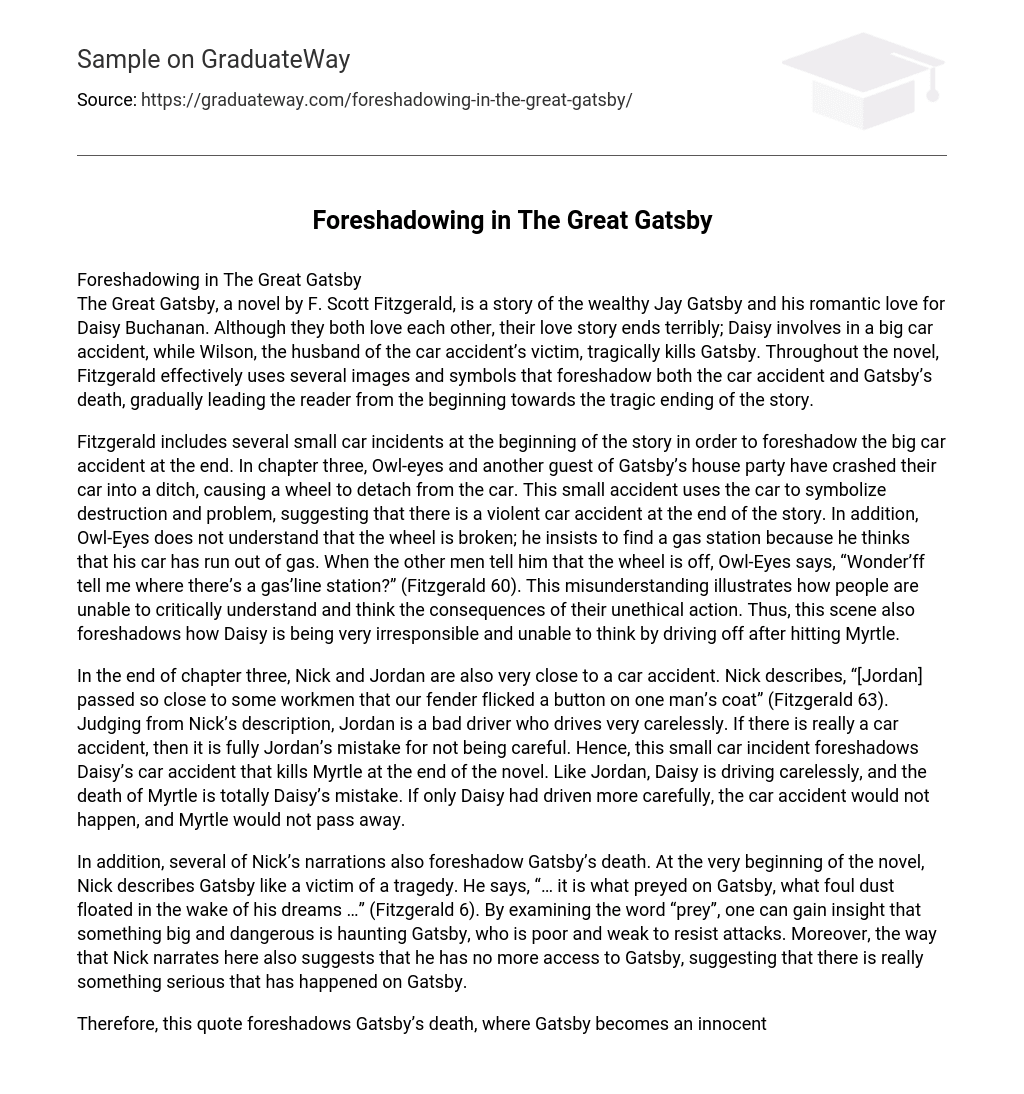The Great Gatsby, a novel by F. Scott Fitzgerald, is a story of the wealthy Jay Gatsby and his romantic love for Daisy Buchanan. Although they both love each other, their love story ends terribly; Daisy involves in a big car accident, while Wilson, the husband of the car accident’s victim, tragically kills Gatsby. Throughout the novel, Fitzgerald effectively uses several images and symbols that foreshadow both the car accident and Gatsby’s death, gradually leading the reader from the beginning towards the tragic ending of the story.
Fitzgerald includes several small car incidents at the beginning of the story in order to foreshadow the big car accident at the end. In chapter three, Owl-eyes and another guest of Gatsby’s house party have crashed their car into a ditch, causing a wheel to detach from the car. This small accident uses the car to symbolize destruction and problem, suggesting that there is a violent car accident at the end of the story.
In addition, Owl-Eyes does not understand that the wheel is broken; he insists to find a gas station because he thinks that his car has run out of gas. When the other men tell him that the wheel is off, Owl-Eyes says, “Wonder’ff tell me where there’s a gas’line station?” (Fitzgerald 60). This misunderstanding illustrates how people are unable to critically understand and think the consequences of their unethical action. Thus, this scene also foreshadows how Daisy is being very irresponsible and unable to think by driving off after hitting Myrtle.
In the end of chapter three, Nick and Jordan are also very close to a car accident. Nick describes, “[Jordan] passed so close to some workmen that our fender flicked a button on one man’s coat” (Fitzgerald 63). Judging from Nick’s description, Jordan is a bad driver who drives very carelessly. If there is really a car accident, then it is fully Jordan’s mistake for not being careful. Hence, this small car incident foreshadows Daisy’s car accident that kills Myrtle at the end of the novel. Like Jordan, Daisy is driving carelessly, and the death of Myrtle is totally Daisy’s mistake. If only Daisy had driven more carefully, the car accident would not happen, and Myrtle would not pass away.
In addition, several of Nick’s narrations also foreshadow Gatsby’s death. At the very beginning of the novel, Nick describes Gatsby like a victim of a tragedy. He says, “… it is what preyed on Gatsby, what foul dust floated in the wake of his dreams …” (Fitzgerald 6). By examining the word “prey”, one can gain insight that something big and dangerous is haunting Gatsby, who is poor and weak to resist attacks. Moreover, the way that Nick narrates here also suggests that he has no more access to Gatsby, suggesting that there is really something serious that has happened on Gatsby.
Therefore, this quote foreshadows Gatsby’s death, where Gatsby becomes an innocent victim of a murder and loses contact with Nick. Besides that, in chapter four, Nick and Gatsby see a hearse on their way to New York. Nick describes, “A dead man passed us in a hearse heaped with blooms, followed by two carriages with drawn blinds and by more cheerful carriages for friends” (Fitzgerald 73).
The hearse is a strong symbol of death, deep sorrow, and grief. In addition, the two carriages of people behind the dead man may also illustrate how the dead man will be gone forever and leave everything, including the people he loves, behind. Hence, this scene strongly foreshadows Gatsby’s death and illustrates how Gatsby will leave everything he has—money, fame, love for Daisy, friends, and business partners—behind.
Thus, Fitzgerald has effectively used several images and symbols in order to foreshadow the tragic outcome of the story. By still using the car accident tragedy, Fitzgerald can actually write another ending of the story. Daisy’s car hits and kills Wilson instead of Myrtle. After Wilson is dead, Tom has the ability to marry Myrtle. As a result, Tom will divorce Daisy. Daisy and Gatsby will then repeat their love life again and marry.
In addition, Nick and Jordan’s love also grows deeper, and they get into a more serious relationship. In the end, Gatsby, Daisy, Nick and Jordan will pursue their life together, and they will live happily ever after. In this version of ending, the car accident, which is constantly foreshadowed, is still present to highlight the major turn-point in the characters’ lives; however, instead of causing major conflicts, murder, and sad ending, the car accident actually leads the characters into a brighter future.
Works Cited
- Fitzgerald, F. Scott. The Great Gatsby. New York, NY: Scribner, 1996. Print.





